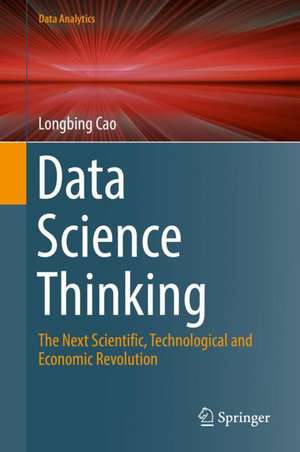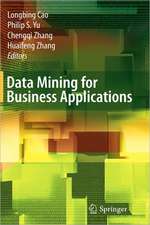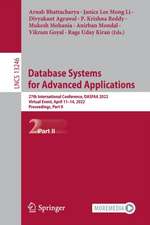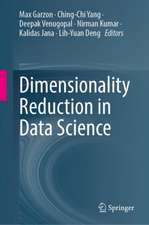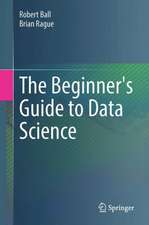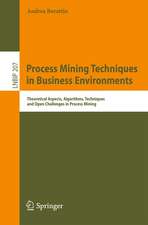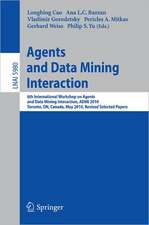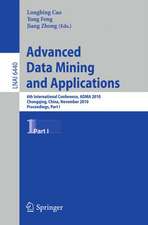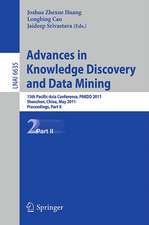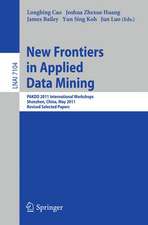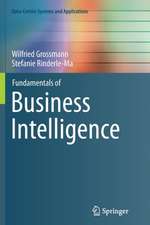Data Science Thinking: The Next Scientific, Technological and Economic Revolution: Data Analytics
Autor Longbing Caoen Limba Engleză Hardback – 7 sep 2018
Data Science Thinking paints a comprehensive picture of data science as a new scientific paradigm from the scientific evolution perspective, as data science thinking from the scientific-thinking perspective, as a trans-disciplinary science from the disciplinary perspective, and as a new profession and economy from the business perspective.
| Toate formatele și edițiile | Preț | Express |
|---|---|---|
| Paperback (1) | 508.94 lei 6-8 săpt. | |
| Springer International Publishing – 31 ian 2019 | 508.94 lei 6-8 săpt. | |
| Hardback (1) | 457.97 lei 3-5 săpt. | +32.32 lei 6-12 zile |
| Springer International Publishing – 7 sep 2018 | 457.97 lei 3-5 săpt. | +32.32 lei 6-12 zile |
Preț: 457.97 lei
Preț vechi: 572.46 lei
-20% Nou
Puncte Express: 687
Preț estimativ în valută:
87.64€ • 92.15$ • 72.41£
87.64€ • 92.15$ • 72.41£
Carte disponibilă
Livrare economică 27 martie-10 aprilie
Livrare express 12-18 martie pentru 42.31 lei
Preluare comenzi: 021 569.72.76
Specificații
ISBN-13: 9783319950914
ISBN-10: 3319950916
Pagini: 436
Ilustrații: XX, 390 p. 62 illus., 61 illus. in color.
Dimensiuni: 155 x 235 x 33 mm
Greutate: 0.75 kg
Ediția:1st ed. 2018
Editura: Springer International Publishing
Colecția Springer
Seria Data Analytics
Locul publicării:Cham, Switzerland
ISBN-10: 3319950916
Pagini: 436
Ilustrații: XX, 390 p. 62 illus., 61 illus. in color.
Dimensiuni: 155 x 235 x 33 mm
Greutate: 0.75 kg
Ediția:1st ed. 2018
Editura: Springer International Publishing
Colecția Springer
Seria Data Analytics
Locul publicării:Cham, Switzerland
Cuprins
1 The Data Science Era.- 2 What is Data Science.- 3 Data Science Thinking.- 4 Data Science Challenges.- 5 Data Science Discipline.- 6 Data Science Foundations.- 7 Data Science Techniques.- 8 Data Economy and Industrialization.- 9 Data Science Applications.- 10 Data Profession.- 11 Data Science Education.- 12 Prospects and Opportunities in Data Science.
Notă biografică
Longbing Cao holds a PhD in Pattern Recognition and Intelligent Systems from the Chinese Academy of Sciences, China and another PhD in Computing Science at the University of Technology Sydney, Australia. He is a professor of data science at UTS. He has been working on data science and analytics research, education, development, and enterprise applications since he was a CTO and then joined academia. Motivated by real-world significant and common challenges, he has been leading the team to develop theories, tools and applications for new areas including non-IID learning, actionable knowledge discovery, behavior informatics, and complex intelligent systems, in addition to issues related to artificial intelligence, knowledge discovery, machine learning, and their enterprise applications. In data science and analytics, he initiated the Data Science and Knowledge Discovery lab at UTS in 2007, the Advanced Analytics Institute in 2011, the degrees Master of Analytics (Research) and PhD in Analytics in 2011 which are recognized as the world's first degrees in data science, the IEEE Task Force on Data Science and Advanced Analytics (DSAA) and IEEE Task Force on Behavior, Economic and Soci-cultural Computing in 2013, the IEEE Conference on Data Science and Advanced Analytics (DSAA), the ACM SIGKDD Australia and New Zealand Chapter in 2014, and the International Journal of Data Science and Analytics with Springer in 2015. He served as program and general chairs of conferences such as KDD2015. In enterprise data science innovation, his team has successfully delivered many large projects for government and business organizations in over 10 domains including finance/capital markets, banking, health and car insurance, health, telco, recommendation, online business, education, and the public sector including ATO, DFS, DHS, DIBP and IP Australia, resulting in billions of dollar savings and mentions in government, industry, media and OECD reports.
Textul de pe ultima copertă
This book explores answers to the fundamental questions driving the research, innovation and practices of the latest revolution in scientific, technological and economic development: how does data science transform existing science, technology, industry, economy, profession and education? How does one remain competitive in the data science field? What is responsible for shaping the mindset and skillset of data scientists?
Data Science Thinking paints a comprehensive picture of data science as a new scientific paradigm from the scientific evolution perspective, as data science thinking from the scientific-thinking perspective, as a trans-disciplinary science from the disciplinary perspective, and as a new profession and economy from the business perspective.
The topics cover an extremely wide spectrum of essential and relevant aspects of data science, spanning its evolution, concepts, thinking, challenges, discipline, and foundation, all theway to industrialization, profession, education, and the vast array of opportunities that data science offers. The book's three parts each detail layers of these different aspects.
The book is intended for decision-makers, data managers (e.g., analytics portfolio managers, business analytics managers, chief data analytics officers, chief data scientists, and chief data officers), policy makers, management and decision strategists, research leaders, and educators who are responsible for pursuing new scientific, innovation, and industrial transformation agendas, enterprise strategic planning, a next-generation profession-oriented course development, as well as those who are involved in data science, technology, and economy from an advanced perspective.
Research students in data science-related courses and disciplines will find the book useful for positing their innovative scientific journey, planning their unique and promising career, and competing within and being ready forthe next generation of science, technology, and economy.
Data Science Thinking paints a comprehensive picture of data science as a new scientific paradigm from the scientific evolution perspective, as data science thinking from the scientific-thinking perspective, as a trans-disciplinary science from the disciplinary perspective, and as a new profession and economy from the business perspective.
The topics cover an extremely wide spectrum of essential and relevant aspects of data science, spanning its evolution, concepts, thinking, challenges, discipline, and foundation, all theway to industrialization, profession, education, and the vast array of opportunities that data science offers. The book's three parts each detail layers of these different aspects.
The book is intended for decision-makers, data managers (e.g., analytics portfolio managers, business analytics managers, chief data analytics officers, chief data scientists, and chief data officers), policy makers, management and decision strategists, research leaders, and educators who are responsible for pursuing new scientific, innovation, and industrial transformation agendas, enterprise strategic planning, a next-generation profession-oriented course development, as well as those who are involved in data science, technology, and economy from an advanced perspective.
Research students in data science-related courses and disciplines will find the book useful for positing their innovative scientific journey, planning their unique and promising career, and competing within and being ready forthe next generation of science, technology, and economy.
Caracteristici
Offers a unique breadth of coverage, providing a comprehensive study of data science, technology and economy perspectives. Presents rich and deep thinking and insights of data-driven research, innovation, industrialization, and opportunities Addresses the needs of decisions-makers who are responsible for managing the new realm of data science. Investigates the mindset and skillset of data scientists to help define the projected course of the data revolution
